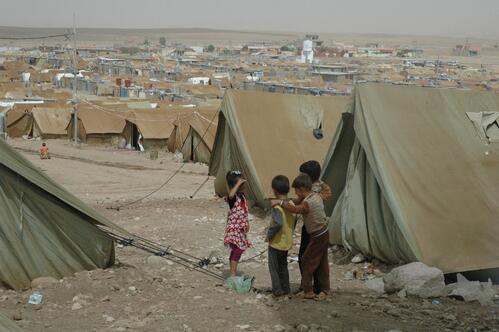As the crisis in Syria intensifies, people continue to flee to neighbouring countries. More then 50,000 Syrians have sought refuge in Iraq, including 42,000 in the Kurdistan region where many live in overcrowded camps.
Domeez camp, near the city of Dohuk in the Kurdish region of Iraq, was set up at the beginning of 2012 and is home today to nearly 15,000 Syrian refugees of Kurdish origin.
Since May 2012, Médecins Sans Frontières (MSF) has been running a 24-hour clinic in the camp, in collaboration with Dohuk’s Department of Health.
Today, we are the camp’s main health provider, offering medical consultations and mental healthcare to the refugees, and providing training for local health staff. To date, our teams have provided over 20,500 consultations.
“Until June there were about 2,000 people settled in Domeez, and the camp was running well,” says Anja Wolz, MSF field coordinator in Dohuk. “But in August, the situation deteriorated because of a sudden massive arrival of refugees. With up to 1,000 people crossing the border each day, the camp quickly became overcrowded and, despite the efforts of the authorities, the level of assistance was clearly insufficient.”
In our consultations, we see many patients suffering from psychological distress.Anja Wolz, field coordinator, Dohuk
For the past few months, major efforts have been made to improve the situation before winter starts. But with around 500 people crossing the border every day into Dohuk governorate, some of the newly arrived refugees in Domeez camp still have to share tents, blankets, mattresses and food with other families.
“I arrived with two of my children, but had to leave my husband and my two other daughters behind,” says a middle-aged Syrian woman. “We walked for more than six hours to cross the border. We don’t have our own tent yet, so we must share with another family. I have a kidney stone and it is very painful.
"Since we arrived here I have been lying down all the time because of the pain. I need surgery to remove the stone. Here, we Syrians suffer from sickness, but also from the difficult situation we have gone through.”



